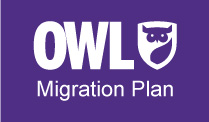Eligibility Requirements
Note: All requests to migrate project sites to OWL Brightspace are subject to review by a team with representation from Western Technology Services, the Centre for Teaching and Learning, and faculty/administrative units.
Requirements for Migrating Project Sites and Creating New Supplementary Courses in OWL Brightspace
OWL Brightspace is Western’s new Learning Management System, serving as a central hub for managing and/or hosting content such as academic courses, prototype courses (e.g., sandboxes, reference courses, templates, etc.), training courses, and supplementary academic content. All content is hosted as a ‘course’ in OWL Brightspace.
To migrate OWL Sakai project site content to OWL Brightspace or to create a ‘course’ to host supplementary academic content in Brightspace, there are three key requirement categories:
1. Technical requirements:
- The 'course' is used by Western users with a Western or Western Continuing Studies account. Guest users will need to obtain a Western account to use OWL Brightspace AND
- Tools used in the OWL Sakai project site have an equivalent tool or feature in OWL Brightspace AND
- A current Western or Affiliate employee needs to be assigned the Maintain role in the OWL Sakai Project Site for it to migrate to a ‘course’ in OWL Brightspace.
2. Content requirements:
- The content is aligned with the academic mission and relevant to Western’s academic goals, values, and strategic priorities AND
- The ‘course’ is not an officially recognized academic course[1] AND
- The ‘course’ serves as a structured[2] resource for academic or professional development, such as training or skill-based modules tied to academic programs or academic courses AND
- Registration and/or completion of the ‘course’ needs to be documented or tracked.
- Participants of supplementary ‘courses’ are active Western students, staff, or faculty, or otherwise have access to a Western account AND
- There is no alternative solution or tool that offers a better user experience AND
- The project site is currently active [3].
Examples of supplementary academic content:
- Indigenous Learning Bundles—digital curriculum resource designed to support instructors in culturally and ethically responsive ways to include local Indigenous knowledges, perspectives, and voices in their courses.
- Academic Integrity Tutorial—joinable tutorial designed to help students understand the meaning of academic integrity and develop the skills necessary to avoid academic offence.
Requirements for supplementary academic content will evolve as use cases emerge.
[1] Academic courses at Western (Undergrad, Graduate, Professional) typically include the following features: credit value, course code, delivery mode defined, assessments and learning objectives.
[2] “Structured”—content is intended to be delivered in a prescribed manner that guides the learner through the content and not just a file storage solution. For example, sites with predominantly text in Lessons pages or files in Resources do not meet the requirements.
[3] Active is defined as currently in use by Western staff, faculty, or students. The content and/or users have been updated within the past year.

